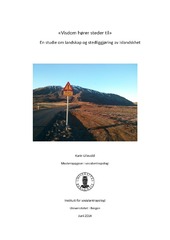"Visdom hører steder til" - En studie om landskap og stedliggjøring av islandskhet
Master thesis
Permanent lenke
https://hdl.handle.net/1956/8509Utgivelsesdato
2014-06-13Metadata
Vis full innførselSamlinger
Sammendrag
The thesis explores national identity in Iceland and the UNESCO World Heritage Site Thingvellir National Park. This is the place where the Icelandic Parliament was established in the year 930 AD. In addition to the unique cultural position, the landscape of Thingvellir holds special geological features typical for Iceland. As such, it remains the birthplace of the nation both in a national historic and geophysical way. The subject of my thesis is to show how icelandicness is expressed through a relation to the landscape and understandings of the Icelandic nature. Thingvellir is a place heavily loaded with symbolic meaning for Icelanders. It is a ceremonial place for the national state, and a sacred space for Icelanders. The landscape at Thingvellir is in a way a narrative landscape, because the landscape is embedded with histories and legends; It is a place where wisdom sits in places" (Basso 1996: 67). There are no distinctively constructed memorials at the site. Therefore I argue, by using Connerton's (2009) terms, that the landscape is more locus than memorial; it is the surroundings of the landscape that is the source of memory of the past, not a constructed memorial. The nature at Thingvellir is alive" with an active geology. This suggests in a way that the landscape has agency. Therefore I question the dualism of nature and culture, two aspects which here so explicitly support each other. The two need to be looked at as a totality in order not to get a loss of meaning of the place. I argue that the UNESCO status fails in doing so by only acknowledging the cultural historic aspects, and therefore it seems to be a somewhat inadequate status at the local level. Thingvellir is also one of the most visited tourist attractions in Iceland, and considered a must-see". But the tourists erode the site, and they can be considered a profane dimension at their sacred site. Also, the tourists are said to not knowing what they look at" because they don't hold the local knowledge of the Icelandic landscape as the Icelanders do. I show how the Icelanders still try to keep the power of definition over their site as a locus". Thingvellir can be looked upon as a presentation of icelandicness", and as such the site stands as a symbol for Icelandic identity.
